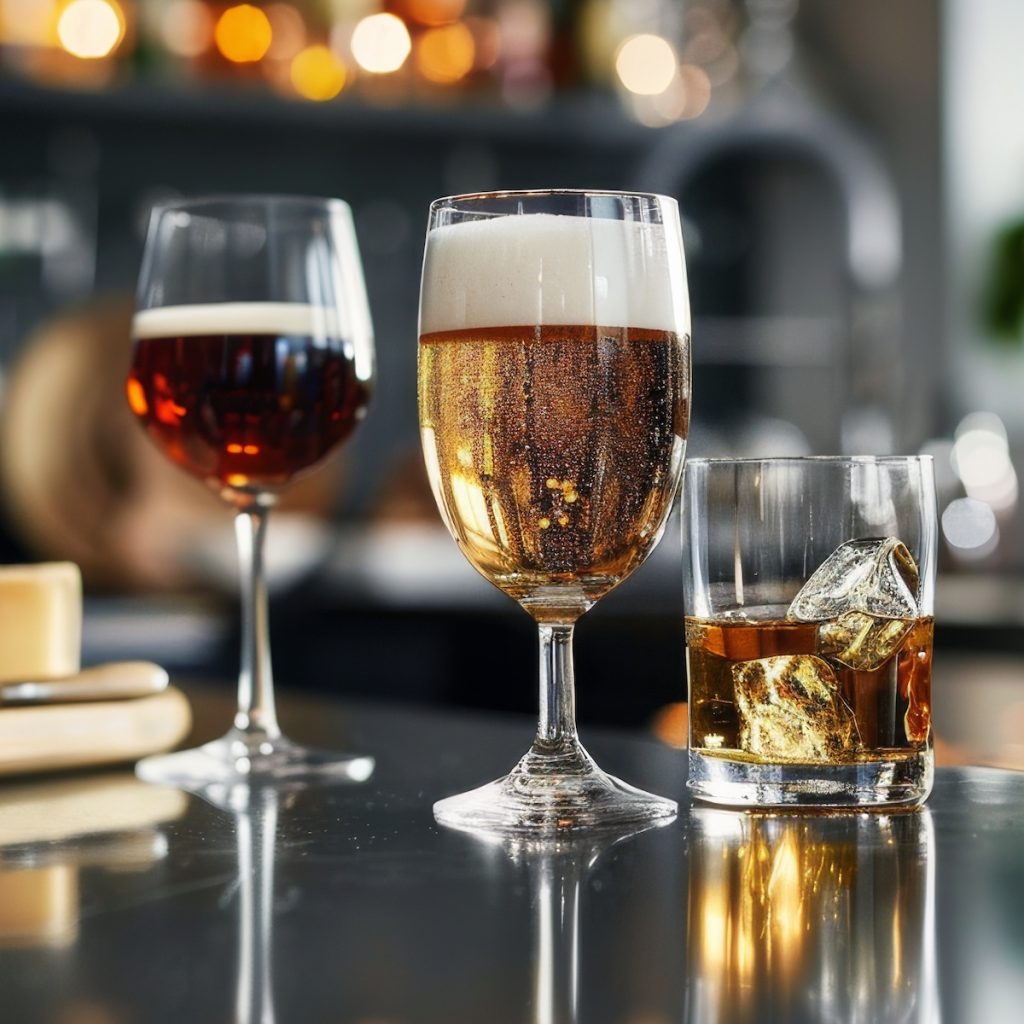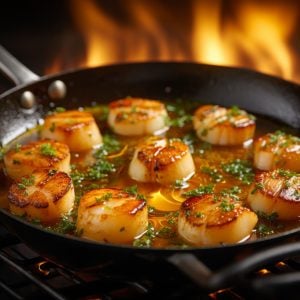If your recipe calls for an alcoholic beverage, what can you use instead?
Cooking with alcohol adds flavor and depth to many dishes. But sometimes, using alcohol isn’t an option. You might not have it on hand or prefer not to use it at all. Whatever the reason, you can still make your recipes delicious with the right substitutions.
Fortunately, there are plenty of alcohol substitutions. Each one mimics the flavor profile and purpose of the alcohol in the recipe. For example, wine often provides acidity, while beer adds richness. Understanding these roles will help you choose the best replacement.
In this guide, I’ll explore common alcohol substitutions for cooking and baking. You’ll learn how to swap wine, beer, liqueurs, and spirits with everyday ingredients. We’ll also share tips for achieving similar flavors and textures.
Whether you’re preparing a sauce, marinade, or dessert, there’s always a way to adjust. With a bit of creativity, you won’t sacrifice taste or quality. These substitutions are also handy for kid-friendly meals or gatherings with non-drinkers.
So, let’s dive in and discover how to cook confidently without alcohol. You might even find some substitutions become your new go-to ingredients!
Sauces
After posting two recipes for Green Peppercorn sauce, I received an email from a gentleman telling me he does not drink any alcohol and would prefer not to use it in any recipe and what he could substitute for red wine.
That’s a great question and one I’m asked a lot. The answer depends on what you are cooking and the type of alcohol the recipe calls for. Although most of the alcohol is cooked off in the process, I can respect someone’s wishes not to handle it at all.
Why cook with an alcoholic beverage in the first place?
The main reason to cook with alcohol is to boost flavor. Red wine, for example, enhances a pan sauce when you use it to deglaze a sauté pan. Beer adds depth to a slow-cooked braise, leaving behind just a touch of alcohol while delivering bold flavor.
Think of holiday rum cakes. My Aunt Tess made rich rum cakes that could practically burn like logs in a fireplace. After a slice or two, we kids always felt a little drowsy during those meals at her house.
Alcohol also serves a functional purpose in cooking. Beer’s yeast helps bread rise, creating a light, airy texture. Acidic wine works in marinades to tenderize meat by breaking down its fibers. And in fondue, wine lowers the cheese’s boiling point, preventing curdling while creating a smooth, creamy texture.
Whether enhancing flavor or driving chemical reactions, alcohol has a unique role in the kitchen.
So what can home cooks use instead of alcoholic beverages?
Some more common substitutes are juices (especially grape, orange, apple, and cranberry), beef, chicken, vegetable stock, vinegar, and fruit syrups.
Extracts As Alcohol Substitutions
Extracts, like vanilla or almond extract, are concentrated flavoring agents made by steeping a flavor source in alcohol. The alcohol acts as a solvent, drawing out and preserving the flavors from ingredients such as vanilla beans, nuts, or citrus peels. It also ensures the extract has a long shelf life.
Most pure extracts contain a high percentage of alcohol—often 35% or more—similar to that of distilled spirits like vodka or rum. However, they are sold in grocery stores because they are classified as flavoring ingredients rather than beverages.
Extracts are not meant for direct consumption, and their small usage amounts in recipes ensure that only minimal alcohol remains in the final dish. In most cases, the cooking process further evaporates the alcohol, leaving only the flavor behind.
It’s also worth noting that not all extracts contain alcohol. There are alcohol-free extracts made with alternative solvents like glycerin, commonly used by people who avoid alcohol for dietary, health, or religious reasons. While these alternatives can replicate some flavors, the traditional alcohol-based extracts are often preferred for their purity and depth of flavor.
Understanding extracts helps you use them wisely in recipes while also knowing why they’re safe and legal to sell in your local store.
Most Commonly Used Alcohol Substitutions
| Beer or Ale | non-alcoholic beer, chicken stock, beef stock or mushroom stock |
| Port | grape juice with a little lime zest, cranberry juice with a little lemon juice added, or orange juice |
| Red Wine | Concord grape juice, red wine vinegar, or non-alcoholic red wine |
| White Wine | white grape juice with a little white wine vinegar added or non-alcoholic white wine |
| Sweet White Wine | white grape juice with a pinch of powdered sugar added. |
| Champagne | ginger ale, sparkling cranberry or white grape juice, or sparkling apple cider |
| Coffee Liqueur | espresso, non-alcoholic coffee extract, or coffee syrup |
Other Commonly Used Alcohol Substitutes
| Amaretto | almond extract |
| Anisette | anise Italian soda syrup or fennel |
| Bourbon | vanilla extract, orange or pineapple juice or peach syrup |
| Brandy | brandy extract |
| Chambord | raspberry juice, syrup, or extract |
| Cherry Liqueur | syrup from a can or jar of cherries |
| Cherry Brandy | is the same as Cherry Liqueur |
| Cognac | juice from peaches, apricots, or pears |
| Cointreau | orange juice concentrate |
| Creme de Cacao | non-alcoholic vanilla extract, and powdered sugar |
| Creme de menthe | spearmint extract diluted in a bit of water |
| Kahlua | coffee liqueur |
| Rum | white grape juice, apple juice, or apple cider flavored with almond extract |
| Sherry | vanilla extract, orange or pineapple juice, or peach syrup |
| Vodka | white grape juice or apple cider mixed with lime juice |





13 Responses
I want to make a double chocolate mousse cake and the recipe says to use 1/4 cup coffee flavoured liqueur. What can I use instead of the liqueur and coffee.
Thank you
@Sahar You can sub 1/4 cup of almost any liquid. If you don’t want the alcohol and you don’t like coffee, you may want to look for a different recipe, but to sub, I’d just go with water or milk. You could also use 1 tablespoon of vanilla (if it’s not already called for) and 3 tablespoons of almost any other liquid that would taste good with chocolate. An out-of-the-box idea would even be orange juice since orange and chocolate go so well together.
How can I substitute Irish cream in a recipe.
Margie, are you looking for a non alcoholic version?
I use Irish Cream coffee syrup as a substitute. I prefer Torani if I want a stronger flavor or DiVinci if I’m going for a more subtle flavor.
Hi, i am making a grasshopper pie and would require an alternative for 4 tbsp of white creme de cacao, how much vanilla extract should i combine with the powdered sugar?
I came here looking for the same answer! My grasshopper pie recipe calls for 3 tablespoons creme de menthe and 3 table spoons white creme de cacao. Since this year a baby will be eating the pie I want to remove the alcohol. A sub for the creme de menthe was easy to find but not the creme de cacao.
Did you ever find an acceptable substitute?
Here is what I found on the Internet: Powdered white chocolate mixed with water, non-alcoholic vanilla extract and powdered sugar.
For the Coffee liqueur, there are coffee syrups that are coffee flavored. We use one that is Kahlua flavored- I think it’s made by DiVinci or Torani and it is sugar free…which for some reason also prevents it from being too sweet. I would add for those who don’t drink coffee, this is also coffee free. (Don’t ask me what it’s made of, I don’t want to know.) Another option is to make Postum (I think it is still available, as it came into production again.) I would add to make it double strength if you go that route.
For the Irish Cream I would use the syrup as well. It will add a bit of sweetness, so you may wish to adjust sugar levels.
The Last thing, anyone use rum extract/flavoring to successfully make chocolate rum truffles (not Rum Balls) or Torrone (Italian Nougat?) I love Sees candies rum nougat and I’m trying to find a way to replicate…but the flavoring and extracts just don’t taste good. Thanks!
I have an ice cream Christmas cake recipe that has 2T brandy.What can I substitute the brandy with?
Hi Ziyanda, as mentioned in the post, you may want to look for a brandy extract.
Apologies if I missed this in the article. Are these substited for each alcohol 1 to 1?
how much alcohol free vanilla extract would I substitute for 1/4 cup of bourbon in a pecan pie chocolate truffle recipe?